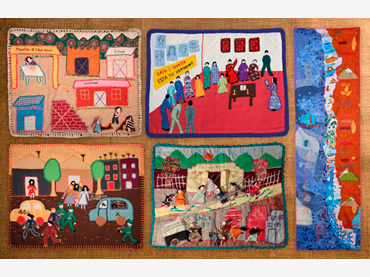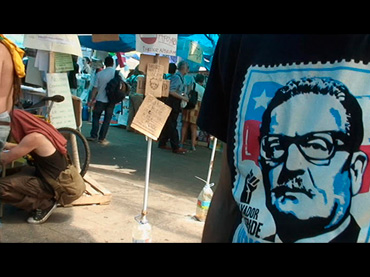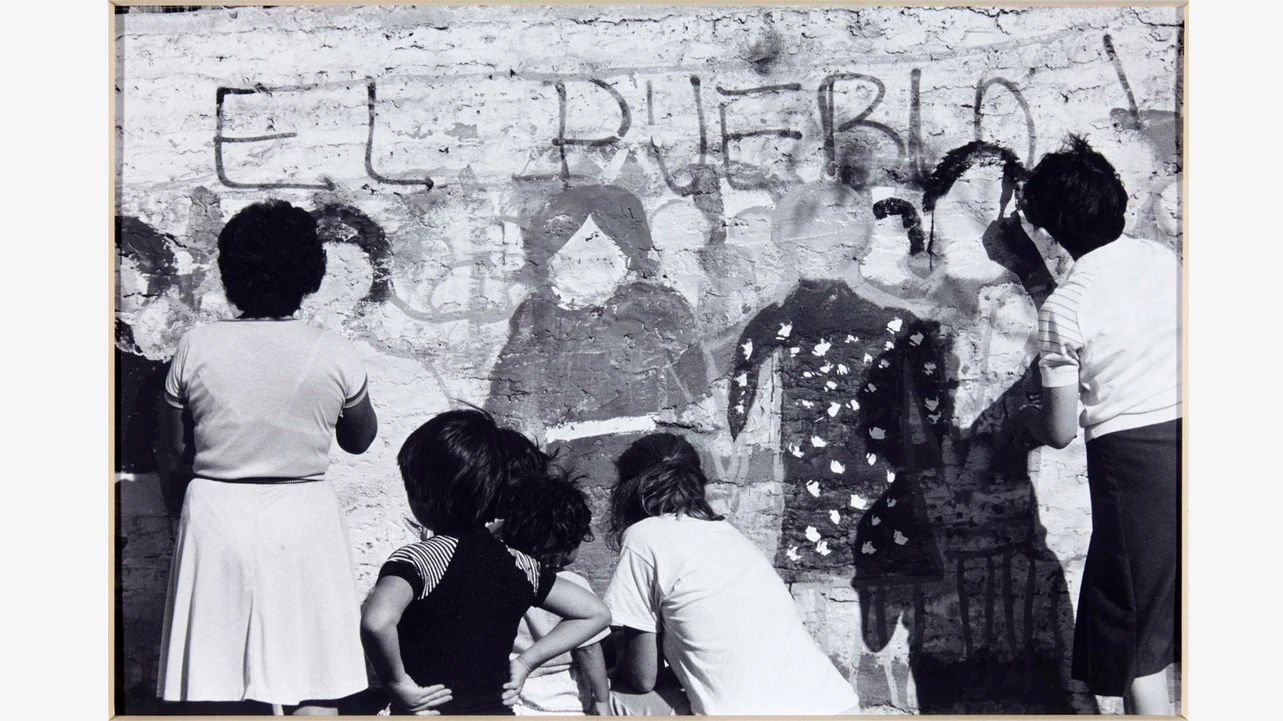-
From 11 to 30 September 2023
José María Berzosa
Chili Impressions
José María Berzosa (Spain, 1928 — France, 2018) is a missing link in the history of Spanish cinema, his filmography, made entirely in France, characterised by the use of sarcasm and parody against despotic power. Coinciding with the fiftieth anniversary of the 1973 coup d’état in Chile, the full version of his documentary series Chili Impressions (1977) is screened in the Museo Reina Sofía, following one sole screening in Spain, which took place in Filmoteca Española in 1981. The documentary’s four episodes unmask the monstrosities of Augusto Pinochet’s dictatorship, while also spotlighting film’s capacity to confront tyranny and represent the subjugated.

-
Saturday, 21 October 2023 Nouvel Building, Protocol Room
Sewing to Heal
The Arpillera as Language and Resistance
Coinciding with the fiftieth anniversary of the 1973 coup d’état in Chile, this conference addresses the language of Chilean arpilleras (burlap works), an exercise of reflection, denouncement and memory developed by groups of women in the dictatorship years. The activity is structured around a conversation on Conflict Textiles’ collection of arpilleras conducted by its founder Roberta Bacic and researcher Marina Vinyes; a symbolic handover ceremony of a series of five Conflict Textiles arpilleras acquired by the Museo Reina Sofía Foundation in 2023; and, as a coda, an arpilleras workshop led by Pilar López and Roser Corbera from the arpilleras group of the Fundació Ateneu Sant Roc (Badalona).

-
Friday, 10, and Saturday, 11 November Nouvel Building, Auditorium 200 and online platform
Chile or Utopian Imagination: On Democracy as Aesthetics
Online platform - Friday, 10Taking place across two days, this encounter examines the cultural practices developed today from memories of the 1973 coup d’état in Chile and the dictatorship. Through poets, artists and creatives, and via different formats, including workshop-lectures, concerts, video art and performances, the activity surveys aesthetic forms and poetic voices from Chile today, underscoring their contributions in the construction of democratic culture y voces poéticas del Chile actual, atendiendo a su contribución en la construcción de una cultura democrática.

Chile or Utopian Imagination
Memory and 50 Years Since the Coup d’état in Chile

Held on 11 Sep 2023
Chile or Utopian Imagination is a programme of activities which gathers film, textile and community art, critical thought and poetry to explore memory in relation to the project of Salvador Allende’s Unidad Popular (Popular Unity) Government, the coup d’état and Augusto Pinochet’s military dictatorship in Chile by way of the work of different artists and thinkers.
During the thousand days the Unidad Popular government was in power, the deep-seated social, economic, cultural and affective transformations that had taken place in Chile were brought to an abrupt end by Augusto Pinochet’s coup d’état. Owing to the large number of deaths that transpired under the dictatorship’s repression, the project led by Salvador Allende remained unfinished, a discontinuation that gave rise to trauma which transformed hopes, desires for equality, lifestyles and ways of relating to the world — effects that are still notable today.
The end of the Unidad Popular utopia and the establishment of the dictatorship resulted in more than 40,000 victims (recognised by the Comisión Valech II report) and Chile’s transformation into the first neoliberalism laboratory on a global scale. But what knowledge is there from the defeat of this utopia? What reflections emerge today from this emotional and institutional rupture?
Critically analysing different ways of staging a traumatic past enables differentiation between a type of passive memory and another that displaces the traces of events to go back and insert them as living matter in an urgent temporality. Thus, the cycle of hope-defeat-hope returned with the social flare-up of October 2019 and denoted the resurgence of feelings which ignited an awareness of the need for community work via new socio-affective strategies. Setting out from this perspective, the programme punctuates the gaze of the exile and the contradictions of dictatorial power, the intergenerational transmission of trauma and the healing of damage, the impact of neoliberalism, the ghost of the end of utopia in Chilean society and new forms of writing and activism to generate utopias.
Organised by
Museo Reina Sofía
Collaboration
Collaboration

Participants
Roberta Bacic, was born in Chile and lives in Northern Ireland. She is a professor of Philosophy and English and a researcher in issues related to human rights. She is the founder of the Conflict Textiles Arpilleras collection, through which she explores the world of arpilleras (burlap works) during Augusto Pinochet’s dictatorship in Chile and the use of artisan textiles as an art form which enables the repression and violence endured, particularly by women, to be condemned.
Cecilia Barriga is a Chilean director, screenwriter and audiovisual producer who has lived in Madrid since 1977. She has documented the situation women face around the world and has explored feminist thought and activism and the construction of identities, both individual and collective. Furthermore, she has closely followed citizen movements such as 15M in Spain, Occupy Wall Street in the USA and the student protests in Chile. Her work has been exhibited internationally in contemporary art museums, on television and at film festivals such as the Indie Film Festivals in New York and Honk Kong, the Mostra de Cinema de Dones de Barcelona, the Festival Viña del Mar in Chile, and festivals in Havana (Cuba), Amiens and Creteil (France). y Creteil (Francia).
Carolina González Castro is the managing director of the Museo Reina Sofía Foundation..
Elicura Chihuailaf is a writer and poet of Mapuche origin who was awarded Chile’s National Prize for Literature in 2020. His work is chiefly bilingual, in Mapudungun and Spanish, and the foundational nature of his practice fosters the flourishing of Mapuche poetry in a modern, written and bilingual style.
Delight Lab is a studio for art, audiovisual design and experimentation around light, video, space and sound, and is conducted by visual and sound artist Andrea Gana and artist and designer Octavio Gana. Together they carry out interventions related to social and environmental issues, and develop projects with Mapuche communities for the preservation of their sacred territories and spiritual culture.
Carolina Espinoza is a journalist who holds a PhD in Social and Cultural Anthropology from Spain’s National University of Distance Education. She has worked for media outlets in Chile and Spain, where she has lived since the year 2000, and her research strands are centred on exile and the intergenerational transmission of trauma. She is currently an adviser for the Study Centre inside the Museo Reina Sofía’s Public Activities Department.
The arpilleras group from the Fundació Ateneu Sant Roc (Badalona) is a collective of women who, from reflection, co-existence and shared action, use the language of arpilleras as a tool of expression to give a voice to those without one. Since its first encounter in 2009, the group has devised exhibitions on themes of community and social commitment to call attention to human rights violations and to foster a culture of peace.
Elvira Hernández is among the most unique voices in contemporary Chilean and Latin American poetry. Her books, published in Chile, Argentina and Colombia, most notably include ¡Arre! Halley ¡Arre! (1986), Meditaciones físicas por un hombre que se fue (1987), Carta de viaje (1989), La bandera de Chile (1991), El orden de los días (1991), Santiago Waria (1992) and Álbum de Valparaíso (2003). In 2018 she was awarded the Jorge Teillier National Poetry Prize and the Pablo Neruda Ibero-American Poetry Award, among other honours.
Mauricio Redolés is a Chilean poet, musician and performer. In 1975, he became a political exile and moved to England, where he lived for ten years. In London he studied at City University, obtaining an A Level in Sociology, and published his first poetry works and released his first tape, Canciones & poemas.
Alejandra del Río Lohan is a poet whose practice spans poetry on paper and performance, work with children, artistic interventions, video-poems and recordings. She is one of the most representative voices from the 1990s generation in Chile.
Álvaro Silva Wuth is a visual artist who makes small-scale wire sculptures. In 2013, he made the piece Últimas palabras (Final Words), the whole transcript of Salvador Allende’s final speech in one sole 70-metre copper wire thread that was unfolded in front of the Ateneo de Madrid in a ceremony of commemoration to mark 40 years since the coup d’état in Chile. In 2017, he donated the work to the Salvador Allende Foundation and was invited to display it in Santiago de Chile’s Plaza de la Constitución, on 11 September of the same year, opposite the Palacio de la Moneda.
Marina Vinyes holds a degree in Humanities and studied Contemporary Film and Audiovisual Studies at Pompeu Fabra University. In 2017, she wrote her doctoral thesis Una palabra propia. Experiencia y relato en las arpilleras chilenas (Self-expression. Experience and Narrative in Chilean Arpilleras), and at present she is a PhD candidate in Visual Arts and Philosophy at the Universitat de Barcelona and Sorbonne University in Paris, where she lectures in the Literature Department. She also oversees the film programme at the Filmoteca de Catalunya.
Más actividades

Institutional Decentralisation
Thursday, 21 May 2026 – 5:30pm
This series is organised by equipoMotor, a group of teenagers, young people and older people who have participated in the Museo Reina Sofía’s previous community education projects, and is structured around four themed blocks that pivot on the monstrous.
This fourth and final session centres on films that take the museum away from its axis and make it gaze from the edges. Pieces that work with that which is normally left out: peripheral territories, unpolished aesthetics, clumsy gestures full of intent. Instead of possessing an institutional lustre, here they are rough, precarious and strange in appearance, legitimate forms of making and showing culture. The idea is to think about what happens when central authority is displaced, when the ugly and the uncomfortable are not hidden, when they are recognised as part of the commons. Film that does not seek to be to one’s liking, but to open space and allow other ways of seeing and inhabiting the museum to enter stage.
![Tracey Rose, The Black Sun Black Star and Moon [La luna estrella negro y negro sol], 2014.](https://recursos.museoreinasofia.es/styles/small_landscape/public/Obra/AD07091_2.jpg.webp)
On Black Study: Towards a Black Poethics of Contamination
Monday 27, Tuesday 28 and Wednesday 29 of April, 2026 – 16:00 h
The seminar On Black Study: Towards a Black Poethics of Contamination proposes Black Study as a critical and methodological practice that has emerged in and against racial capitalism, colonial modernity and institutional capture. Framed through what the invited researcher and practitioner Ishy Pryce-Parchment terms a Black poethics of contamination, the seminar considers what it might mean to think Blackness (and therefore Black Study) as contagious, diffuse and spreadable matter. To do so, it enacts a constellation of diasporic methodologies and black aesthetic practices that harbor “contamination” -ideas that travel through texts, geographies, bodies and histories- as a method and as a condition.
If Blackness enters Western modernity from the position of the Middle Passage and its afterlives, it also names a condition from which alternative modes of being, knowing and relating are continually forged. From within this errant boundarylessness, Black creative-intellectual practice unfolds as what might be called a history of touches: transmissions, residues and socialities that unsettle the fantasy of pure or self-contained knowledge.
Situated within Black radical aesthetics, Black feminist theory and diasporic poetics, the seminar traces a genealogy of Black Study not as an object of analysis but as methodological propositions that continue to shape contemporary aesthetic and political life. Against mastery as the horizon of study, the group shifts attention from what we know to how we know. It foregrounds creative Black methodological practices—fahima ife’s anindex (via Fred Moten), Katherine McKittrick’s expansive use of the footnote, citation as relational and loving labour, the aesthetics of Black miscellanea, and Christina Sharpe’s practices of annotation—as procedures that disorganise dominant regimes of knowledge. In this sense, Black Study is approached not as a discrete academic field but as a feel for knowing and knowledge: a constellation of insurgent practices—reading, gathering, listening, annotating, refusing, world-making—that operate both within and beyond the university.
The study sessions propose to experiment with form in order to embrace how ‘black people have always used interdisciplinary methodologies to explain, explore, and story the world.’ Through engagements with thinkers and practitioners such as Katherine McKittrick, C.L.R. James, Sylvia Wynter, Christina Sharpe, Fred Moten, Tina Campt, Hilton Als, John Akomfrah, fahima ife and Dionne Brand, we ask: What might it mean to study together, incompletely and without recourse to individuation? How might aesthetic practice function as a poethical intervention in the ongoing work of what Sylvia Wynter calls the practice of doing humanness?

Intergenerationality
Thursday, 9 April 2026 – 5:30pm
This series is organised by equipoMotor, a group of teenagers, young people and older people who have participated in the Museo Reina Sofía’s previous community education projects, and is structured around four themed blocks that pivot on the monstrous.
The third session gazes at film as a place from which to dismantle the idea of one sole history and one sole time. From a decolonial and queer perspective, it explores films which break the straight line of past-present-future, which mix memories, slow progress and leave space for rhythms which customarily make no room for official accounts. Here the images open cracks through which bodies, voices and affects appear, disrupting archive and questioning who narrates, and from where and for whom. The proposal is at once simple and ambitious: use film to imagine other modes of remembering, belonging and projecting futures we have not yet been able to live.

Remedios Zafra
Thursday March 19, 2026 - 19:00 h
The José Luis Brea Chair, dedicated to reflecting on the image and the epistemology of visuality in contemporary culture, opens its program with an inaugural lecture by essayist and thinker Remedios Zafra.
“That the contemporary antifeminist upsurge is constructed as an anti-intellectual drive is no coincidence; the two feed into one another. To advance a reactionary discourse that defends inequality, it is necessary to challenge gender studies and gender-equality policies, but also to devalue the very foundations of knowledge in which these have been most intensely developed over recent decades—while also undermining their institutional support: universities, art and research centers, and academic culture.
Feminism has been deeply linked to the affirmation of the most committed humanist thought. Periods of enlightenment and moments of transition toward more just social forms—sustained by education—have been when feminist demands have emerged most strongly. Awareness and achievements in equality increase when education plays a leading social role; thus, devaluing intellectual work also contributes to harming feminism, and vice versa, insofar as the bond between knowledge and feminism is not only conceptual and historical, but also intimate and political.
Today, antifeminism is used globally as the symbolic adhesive of far-right movements, in parallel with the devaluation of forms of knowledge emerging from the university and from science—mistreated by hoaxes and disinformation on social networks and through the spectacularization of life mediated by screens. These are consequences bound up with the primacy of a scopic value that for some time has been denigrating thought and positioning what is most seen as what is most valuable within the normalized mediation of technology. This inertia coexists with techno-libertarian proclamations that reactivate a patriarchy that uses the resentment of many men as a seductive and cohesive force to preserve and inflame privileges in the new world as techno-scenario.
This lecture will address this epochal context, delving into the synchronicity of these upsurges through an additional parallel between forms of patriarchal domination and techno-labor domination. A parallel in which feminism and intellectual work are both being harmed, while also sending signals that in both lie emancipatory responses to today’s reactionary turns and the neutralization of critique. This consonance would also speak to how the perverse patriarchal basis that turns women into sustainers of their own subordination finds its equivalent in the encouraged self-exploitation of cultural workers; in the legitimation of affective capital and symbolic capital as sufficient forms of payment; in the blurring of boundaries between life and work and in domestic isolation; or in the pressure to please and comply as an extended patriarchal form—today linked to the feigned enthusiasm of precarious workers, but also to technological adulation. In response to possible resistance and intellectual action, patriarchy has associated feminists with a future foretold as unhappy for them, equating “thought and consciousness” with unhappiness—where these have in fact been (and continue to be) levers of autonomy and emancipation.”
— Remedios Zafra

ARCO2045. The Future, for Now
Saturday 7, March 2026 - 9:30pm
The future, its unstable and subjective nature, and its possible scenarios are the conceptual focus of ARCOmadrid 2026. A vision of the future linked to recent memory, a flash of insight into a double-edged sword. This year's edition, as in the previous two, will once again hold its closing party at the Reina Sofia Museum. This time, the star of the show is Carles Congost (Olot, Girona, 1970), one of the artists featured in the new presentation of the Collections recently inaugurated on the 4th floor of the Sabatini Building.
Carles Congost, with his ironic and timeless gaze, is responsible for setting the tone for this imperfect future, with a DJ session accompanied by some of his works in the Cloister on the first floor of the Sabatini Building of the Museo on the night of Saturday 7 March.